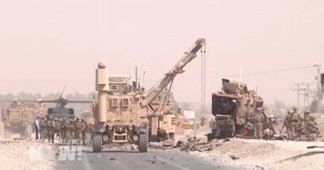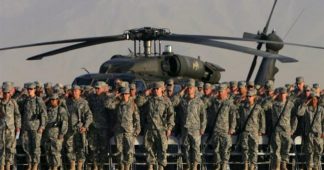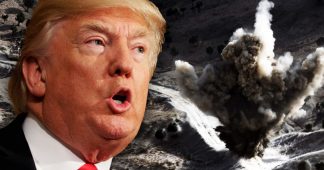Will Blackwater Replace the World’s Most Powerful Military to Win Afghan War?
By Masud Wadan
Established in 1997, the Blackwater private security company was not so aged when hired into the US’ lengthiest Afghan war in 2001 and later Iraq war in 2003. Not so later from 9/11 tragedy, the company entered into a contract worth of US$ 5, 4 million with the US government to secure CIA headquarter in Kabul. On the Iraq side, it had earned enough US trust to strike a deal of US$ 27 million with Pentagon to ensure the security of military headquarter in the country.
The Blackwater is not a US-wide but a worldwide giant security company that undertakes critical Pentagon and CIA missions across the world. This security firm, which is notorious for its rebellion, irresponsibility and lack of conscientiousness, has displayed its non-compliance to international and the related nation’s rules and laws in Iraq war.
Afghanistan has its own grim record of the security company’s inappropriate and fatal operations. In 2010, Afghan government unexpectedly stepped forward and disbanded all the national security firms for its inadequacy and risk-posing to the nation. Many years later now, the US is considering putting those bitter experiences back into play.
Once approved, the Blackwater would get the entire responsibility for combat and training missions. The Blackwater and DynCorp security companies have previously led operations in Afghanistan that has left a stain on people’s memories from the US’ military mission. Following the end of US forces’ combat mission in 2014, both companies’ role waned. A possible comeback of an already tasted allied force would bear nothing but grow cynicism and wrath among people against the US government’s military arrangements in Afghanistan.
A switch to the Blackwater as well as mismanagement of Afghan war at its hand as a subsequent case could backfire by wresting any US-favored population into rebel’s embrace. Situation would go from worse to worst, not to mention it would superhumanly outperform in restoring security as the declared goal of the US government.
The Blackwater Company might have barely missed foothold in any territory worldwide where the US has intended intervention. Amid Ukraine crisis, reports gave away about traces of the Blackwater’s footing in the country to fight in favor of the US against Russia. The company’s role in Ukraine’s standoff circulated explosively after Crimea’s annexation to Russia gave rise to new heights of the US-Russia tensions.
The story began when news websites posted a video report about presence of anonymous armed forces in Donetsk, Ukraine. Based on reports, these masked men stormed a pro-Russia rally. While dispersion, the marchers were shouting “Blackwater”.
On September 16, 2017, a Blackwater squad sprayed fires on a bulk of civilians in Nisour Square in Iraq and killed 17 people. The squad claimed the assault was an act of defense to threat posed from people, while investigations and eyewitness accounts found no ground for preemptive attack.
New York Times in one of its earlier issues had revealed that the Blackwater’s agents in concert with CIA led plenty covert operations in Iraq between 2004 and 2006. The report elucidated that then-CIA director Leon Panetta denied involvement in the operations with the private company.
Moving on to Pakistan, the Blackwater drew up and conducted sweeping terrorist operations in 2009, while Musharraf-led government often played down presence of the company in the country. On September 2010, a high-profile American journalist and columnist Wayne Madsen brought out evidences about the Blackwater’s role behind terrorist blasts in Pakistan. He maintained that the Blackwater’s operatives are the leading organizers of terrorist attacks in that country and “Pakistani Taliban” was just a name used to pin these attacks on them. At the time, relevant Pakistani authorities’ investigation revealed that the Blackwater under its new title “Total Intelligence Solution” was active in Islamabad, Peshawar, Quetta and Karachi.
The long-awaited new US strategy on Afghanistan would be nothing other than doubling the reinforcement as Sen. John McCain declared his own strategy that would clear the path for a likely switch to deployment of private forces. Donald Trump’s advisors who own private security companies insist on shifting Afghanistan’s security job away from the US army to private forces.
Now if we contemplate the White House’s recent discourse on Afghan war from a different viewpoint, it comes out that there is only concentration about war options and no alternative to conflict is imminent. Oil, arms, intelligence and private security experts encircling White House are in command of foreign policies. For certain, all the pronouncements from the White House have something to do with war.
Two of Trump’s advisors including his son-in-law Jared Kushner attempt to hand Afghanistan’s lengthy war over to the Blackwater and the DynCorp private security firms. Although a dramatic cut in military expenditure from US$ 45 billion a year to US$ 10 billion a year as well as a slash in the US troop’s causalities have been presented as supporting reasons by advisors, it is not a matter of a tiny war zone to be handled by an organization when a powerful government [the US] admits failure on the ground. The advisors like Jared Kushner may be serving as a broker between the White House and familiar sources such as Erik Prince founder of the Blackwater who are relatives.
Donald Trump acceded to the White House as a businessman almost completely incognizant of the US’s war operations throughout the world. He unexpectedly didn’t speak a single word about the US’s protracted and costly Afghan war, all because he’s not interested in wars. Even today, he breaks into argument with his advisors about Afghan war and opposes any plan that multiplies the US’s war costs.
Things are running counter to his plans; else the global war games might have gone upside down if he was at the helm of everything. The President Trump also noted that Pentagon is left with no option to continue war in Afghanistan. In a meeting with its national security team, Trump argued that the US is “losing” war in Afghanistan while pointing to a map depicting regions captured by the Taliban. He even suggested that Gen. John Nicholson, the US commander in Afghanistan be fired, NBC news reports.
Reports say in spite of the US defense department’s repeated demands, Trump is unwilling about lasting Afghan war and views it groundless to add in already 9,000 US troops on the ground. Trump disagrees with National Security Advisor McMaster’s roadmap. In a recent US National Security Council’s meeting, although the security advisor resisted with Trump’s refusals, he failed to bring him on the track. The US State Secretary Rex Tillerson also said that Trump is asking tough questions about Afghanistan’s war and is reluctant to see the war continuing as before.
While Trump is likely to accept the private security plan, defense secretary James Mattis and McMaster, among others, disapprove with it. As Trump tends to abolish whatever he regards as unnecessary just to make cuts in expenditures, he may lean on privatization of security efforts in Afghanistan. It would also rid him of mulling over new strategy on Afghanistan. He’s a big taxpayer himself, so he understands the worth of money very well, yet he’s not up to end the war.











